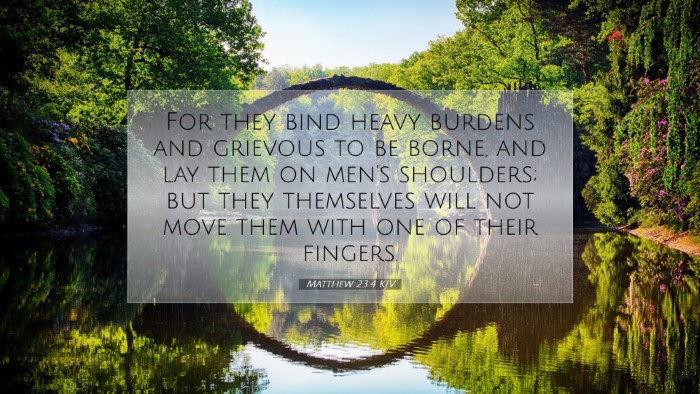Commentary on Matthew 23:4
Verse Reference: Matthew 23:4 - "For they bind heavy burdens, hard to be borne, and lay them on men’s shoulders; but they themselves will not move them with one of their fingers."
Overview
In this verse, Jesus is addressing the Pharisees and the religious leaders of His time. He critiques their approach to spiritual leadership, highlighting the burdens they impose on others while failing to assist in carrying those burdens themselves. This commentary synthesizes insights from prominent public domain theologians, aiming to provide a comprehensive understanding of the implications of this passage for pastors, theologians, and students of Scripture.
Contextual Background
Understanding Matthew 23 requires an appreciation of the socio-religious context of first-century Judaism. The Pharisees were highly regarded for their piety and strict adherence to the Law, yet Jesus exposes the hypocrisy in their actions. They had turned the legalistic observance of the Law into a heavy yoke rather than a source of spiritual freedom.
Historical Insights
Albert Barnes notes that the Pharisees created an elaborate system of regulations and traditions that convoluted the essence of God’s commands. This system was not only burdensome but paradoxically served to elevate their own status as spiritual leaders, illustrating a disconnect between their rhetoric and their actions.
Theological Implications
The principal theological message in Matthew 23:4 revolves around the theme of leadership and responsibility. Jesus emphasizes the importance of not merely demanding obedience but actively participating in the carrying of burdens.
Spiritual Leadership
Matthew Henry articulates that true leaders in the church are called to model the humility of Christ rather than exercising authority over others in a domineering fashion. They should be exemplars of service, particularly in understanding the struggles of their congregants. Henry emphasizes that effective ministry is characterized by compassion and support rather than imposition of legalistic demands.
Human Burdens and Divine Grace
In this commentary, Adam Clarke elaborates on the metaphor of burdens. He explains that the "heavy burdens" the Pharisees imposed were often symbolic of the legalistic interpretations of the Law that overwhelmed the faithful. In contrast, Christ invites all who are weary to come to Him for rest (Matthew 11:28-30), establishing a stark juxtaposition between the expectations of the religious elite and the liberating grace offered by Christ.
Practical Applications
As contemporary church leaders reflect on this passage, there are profound lessons to be gleaned regarding the heart of pastoral ministry and community engagement.
-
Empathy in Leadership: Recognize the weight of life’s burdens that individuals carry. Leaders should strive to understand and share in the struggles of their congregation.
-
Avoiding Legalism: Guard against creating additional burdens through rigid rules and regulations that overshadow the gospel message. Instead, teach the grace and love of Christ as foundational to faith.
-
Encouraging Supportive Community: Foster an environment in which members of the church uplift one another, sharing burdens in a spirit of love and unity (Galatians 6:2).
-
Modeling Servanthood: Lead by example, engaging actively in acts of service and mercy, reflecting the character of Jesus who came not to be served but to serve (Mark 10:45).
-
Continuous Self-Reflection: Leaders must regularly assess their own practices against the teachings of Christ to ensure alignment with biblical principles of service and humility.
-
Promoting Spiritual Freedom: Teach and embody the truth that Christ’s burden is light. Encourage members to experience the joy of living in accordance with biblical truths without the weight of unnecessary rules.
-
Engaging with the Marginalized: Be intentional about reaching out to those who feel alienated or overwhelmed by life’s burdens. Provide practical and spiritual support.
-
Prayer and Dependence on God: Encourage reliance on God’s strength rather than self-sufficiency. Regular prayer and communal dependence are vital in lightening burdens.
-
Cultivating a Culture of Compassion: Together, work towards creating a compassionate community that mirrors the love of Christ for all its members and the broader society.
-
Encouraging Rest in Christ: Teach the importance of finding rest and solace in Christ, drawing from Matthew 11:28-30, thus promoting spiritual health in the community.
-
Reflecting on Doctrinal Purity: Consistently return to Scripture to ensure that teachings are rooted in biblical truth and that they edify rather than burden.
-
Staying Accountable: Engage in mutual accountability with fellow leaders to address issues of legalism and to encourage each other in adopting a servant-hearted approach.
-
Advocacy for Justice: Be advocates for those who are oppressed or burdened unjustly, following the heart of God as revealed in Scripture.
-
Building Up Instead of Tearing Down: Prioritize encouragement and building up the body of Christ, ensuring that the church environment is one of safety and acceptance.
-
Teaching True Righteousness: Focus on teaching righteousness as a heart issue rather than merely outward conformity to rules, thus leading to transformational living.
-
Cultivating a Joyful Community: Encourage joy in serving one another and in pursuing faith together, cultivating a vibrant church community.
-
Emphasizing the Role of the Holy Spirit: Lean on the guidance of the Holy Spirit to actively help in bearing one another's burdens effectively.
-
Integrating Worship and Service: Help members see the connection between worship and service, where both are expressions of love for God and neighbor.
-
Continued Study of God’s Word: Encourage ongoing learning and application of Scripture as a way to understand the heart of God in regards to burdens and grace.
-
Celebrating Community Strengths: Recognize and celebrate the strengths of the community while collectively addressing areas of need and how to meet them gently.
-
Creating Safe Spaces for Sharing Burdens: Develop programs or support groups within the church that provide avenues for people to share their burdens without fear of judgment.
-
Modeling Vulnerability: Leaders should model vulnerability, openly sharing their own struggles to foster an environment of love and transparency.
-
Encouraging Rest for Leaders: Remind church leaders to take time for rest and spiritual renewal, thereby preventing burnout and enabling them to better serve others.
-
Integrating Outreach as Burden Bearing: Encourage church involvement in community outreach as a form of bearing burdens; illustrate how collective action brings hope and support.
Conclusion
Matthew 23:4 serves as a critical reminder for today’s church leaders to embody the servant leadership modeled by Christ. By avoiding legalism and embracing compassion, leaders can foster a community that mirrors the grace and love of God. It is a call to action for the church to alleviate burdens, encourage one another, and reflect the heart of the Gospel in all interactions.


